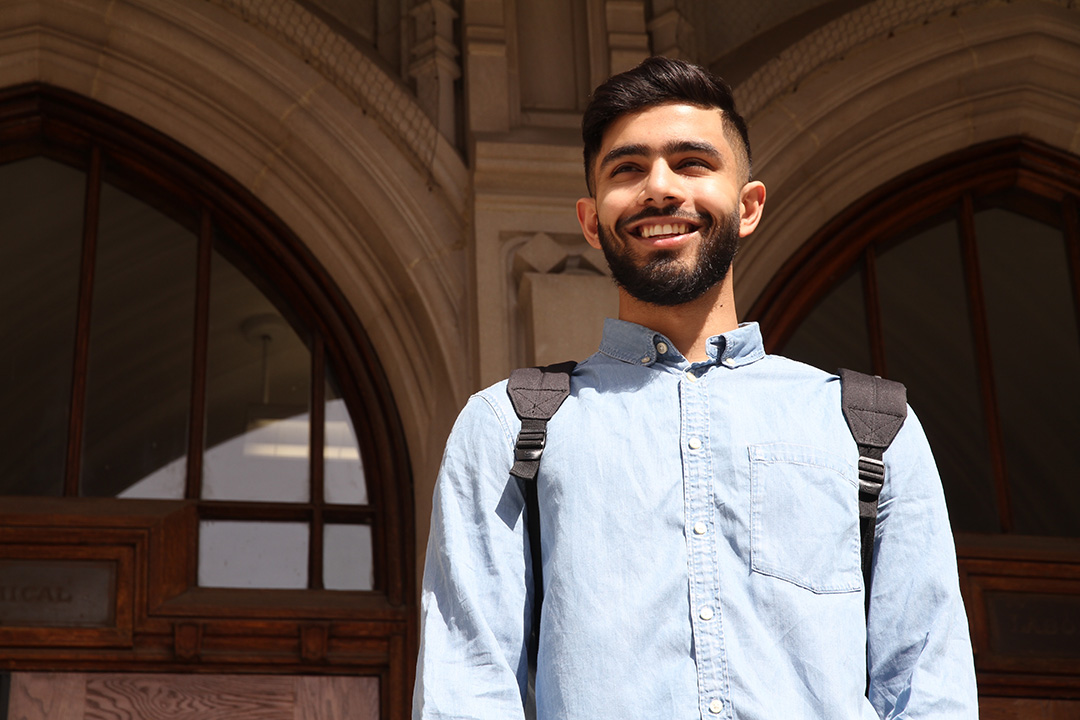
U of S political studies student heading to Harvard Law School
When Areeb Salim first began classes at the University of Saskatchewan four years ago, he wasn’t sure whether he wanted to eventually study medicine or law.
By James ShewagaBut his remarkable performance on the Law School Admissions Test (LSAT) quickly settled the issue. The 21-year-old student from Regina scored an astounding 177 on the LSAT, placing him in the 99.8 percentile, essentially finishing in the top two out of a thousand students.
“My plan was to write the LSAT in the summer of my second year and write the MCAT (Medical College Admission Test) in the summer of my third year,” said Salim, who received his Bachelor of Arts (majoring in political studies) at U of S Spring Convocation on June 5. “But after I got my LSAT score back, I thought that it was a sign that I should study law.”
Indeed. Salim’s LSAT score and academic achievements at the U of S opened up a world of opportunity, with Ivy League schools in the United States offering scholarships of up to $150,000. After weighing offers from the likes of Duke, Columbia, Georgetown and New York University, Salim selected Harvard Law School and will proudly represent his home province and the U of S at one of the world’s most prestigious law schools this fall.
“After visiting Harvard I knew that is where I wanted to be and I want to show that U of S grads can make it there,” said Salim, who had an overall average of 84.63 per cent in his undergraduate studies. “When I visited Harvard, everybody was graduating from Yale or the University of Chicago or schools like that, and I was from Saskatchewan and everyone was asking me where that is. So, I want to go there and show that somebody from Saskatchewan, who is a minority, can go and succeed at Harvard.”
U of S political studies professor Kalowatie Deonandan said Salim has been one of the most impressive students that she has had the pleasure of teaching in her career.
“He has superb analytical and writing skills and I would say he is amongst the top one per cent of students that I have had in over 25 years,” said Deonandan, who is bringing in Salim as a research assistant for the summer.
A former two-time national debating champion in high school, Salim said he thoroughly enjoyed his time on campus and credits the education that he received, and the U of S professors that he grew to admire, with helping him get into Harvard.
“I am really confident that my studies here at the U of S have prepared me well for Harvard,” said Salim. “When I came here, I wasn’t sure if I wanted to pursue law or medicine, so the arts and science degree was perfect for me because it allows you to take a broad spectrum of classes.
“So, the fact that I could get a political studies degree while being able to take electives that appeal to my interests, that was huge for me.”
Salim said he was able to strike a balance between studying and socializing with friends and family, while helping tutor other students and also playing competitive soccer.
“I want to prove that a U of S education is as good as any education anywhere and I want to show that you can succeed without focusing solely on academics, that you can have time for a social life,” said Salim, whose parents Najma and Muhammad are both doctors, with older sister Nitasha in the U of S
College of Medicine and younger sister Ahmereen at the University of Regina. “My family and friends have been huge for me and I wouldn’t have got into Harvard without them. When I was stressing out over the decision, they were there for me.”
Passionate about social justice causes, Salim said he would like to work internationally, but is also interested in returning to Saskatchewan to work on Indigenous issues.
“I want to be in a position where I can have a dynamic work life and be in a leadership role to maximize the impact that I can have, whether it’s in law or politics or other areas,” said Salim, who volunteered in the last provincial election as a campaign canvasser. “I believe that law is one of the mechanisms in which you can achieve institutional change. And there are a lot of important issues, like the marginalization of minorities, refugee issues, Aboriginal issues, multi-national corporations exploiting workers. There is a plethora of issues that I am interested in.”
But first, Salim is celebrating having completed his first degree.
“It’s interesting to sit back and think about what a bachelor’s degree really means, because I have been so busy focusing on exams and papers,” he said. “It’s important to appreciate the moment and know that what I have learned over these four years, both academically and otherwise, will help me throughout my life.”

